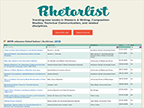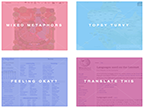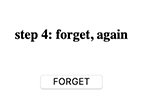Open Issue
24.2 Spring 2020
Logging On
In This Issue
Cheryl Ball, Editor
-
Disputatio
-
Building Rhetorlist: A Call for Small, Meaningful Projects in Rhetoric & Composition
Tim Lockridge

This webtext focuses on Lockridge's production of Rhetorlist, an inventory of new books published in Rhetoric and Writing, Composition Studies, Technical Communication, and related disciplines. Tracing the histories and challenges of these disciplines' engagement with digital tools, Lockridge argues for an attention to small, meaningful projects of service to field, and offers strategies for the development of such projects.
-
Screen Reading: A Gallery of (Re)Imagined Interfaces
Bethany Monea

This webtext is a digital gallery of six (re)imagined interfaces, designed to de-familiarize and call attention to the material and aesthetic components of web design. By (re)imagining six everyday interfaces that commonly mediate online activity, the gallery offers space for viewers to question and explore issues of navigation, orientation, metaphor, language, embodiment, and infrastructure that undergird human-computer interaction.
-
Forgetting as a Function: When the Internet Wants to Remember, How Can We Learn to Forget?
Sarah Welsh

In this article, I propose a social process for digital forgetting (or promoting forgetfulness of media traces that should be relatively inconsequential) using one successful example from Twitter. One example is of course not exhaustive, but it was chosen as a representative model of the ways users are learning to forget. If our systems are not built to forget, we might consider how we can do so not (only) by combating technological functions, but by working with them.
-
-
Topoi
-
Don’t Read the Comments: Women’s Rhetorical Strategies in the Comments Sections of News Articles
Bailey Madison Poland

The comments sections below online news articles are popularly regarded as hostile—but many scholars see comments sections as spaces that expand democratic discourse. This webtext complicates the tension between these two interpretations of the comments sections by examining women’s rhetorical strategies in response to gendered hostility that accompany articles covering feminism and women’s issues.
-
Persuasion, Procedure, and Planeswalkers: The Protocological Rhetoric of Magic: The Gathering
Kevin Brock, Trevor C. Meyer, & Adam S. Lerner

In this webtext, we explore how Magic and other complex analog systems operate rhetorically as activity networks. Our scrutiny of Magic’s protocols leads us to consider and compare the game’s anticipated activities (as described in its game rules and our social expectations, conventions, and norms involved in playing the game) with its realized expressions of those activities (as encountered when actually playing one or more iterations of the game itself).
-
Rhetoric's Outliers in Second Language Writing: A Corpus-Enabled Study
Jay Jordan

This webtext reports on initial corpus-based analysis of roughly 45 years' worth of scholarship in top-tier journals in the field of second language writing. Findings suggest that while “rhetoric” is variously inflected by specific, historical preoccupations of the field, articles throughout the corpus evince a sustained interest in deploying “rhetoric” as a label that names explicit pedagogical targets for multilingual student writers.
-
-
Inventio
-
Weaving and Yarning Sovereign Relationships
Aunty Lorraine Tye, Yoko Akama, Linda Elliott, Seth Keen, Faye McMillan, Mark McMillan, & Peter West

This webtext pursues pluralities by exploring how text, video, and images can be braided to evoke sovereign relationships. Indigenous sovereignty is a significant premise of this work, animated through weaving and yarning – both a practice of Indigenous sovereignty and a graceful methodology that invites non-Indigenous and Indigenous sovereignties to strengthen and maintain sovereign relationships.
-
-
Praxis
-
'Stronger Together': Open Pedagogy, Digital Scholarship, and Hillary Clinton's Rhetorical Appeal
Julia Canzoneri, Brie Cronin, Iris Finkel, Melissa Harden, Wendy Hayden, Alex Kreichman, Dana Krugle, Sarah Parente, Rasha Reda, & Christina Yim

Open Pedagogy relies on tools and collaboration to facilitate public discourse. Student projects are linked throughout the narrative, which were also collaboratively composed. As we will demonstrate, the inclusion of digital tools enabled students to engage with the rhetoric on a level appropriate for the times, creating our own kairotic moment.
-
What Reddit Has to Teach Us About Discourse Communities
Ryan Shepherd

This webtext provides one way to teach students how to enter a new discourse community; allowing them to then use what they’ve learned to enter new discourse communities after leaving their composition classes. The purpose is not to teach students a specific discourse so much as to teach them how to recognize and enter new discourse communities on their own.
-
-
PraxisWiki
-
Connecting Writing Programs and Faculty with Disability Services
Jay Dolmage, Melissa Helquist, & Tara Wood
-
A DIY Electronic Survey Device for Studying User Experience
John T. Sherrill
-
Visualizing Suffering: Undergraduate Big Data and Humanities Research on Affect and Politics
Astrid Giugni & Jessica Hines
-
Interviews
-
Ways of Knowing and Doing
Stephen J. McElroy, Matthew Davis, & Rory Lee
A synthesis of converging and contrasting perspectives on ways of knowing and doing in digital rhetoric pedagogy among 25 teacher-scholars that provides a rough sketch of the state of digital rhetoric pedagogy as it is understood and practiced in the second decade of the 21st century and as it is told by a range of voices, including leading voices, in the subfield of Digital Rhetoric and identifies and highlights areas of productive tension among interviewees’ responses.
-
Index: All Kairos Interviews
Reviews
-
A Review of Retroactivism in the Lesbian Archives: Composing Pasts and Futures by Jean Bessette
Maria Alberto
-
Review of Bad Ideas About Writing edited by Cheryl Ball and Drew Loewe
Brandie Bohney, Johnathan Brownlee, Renee Ann Drouin, Ran Meyer, Bailey Poland, Brian Urias, & Lena Ziegler
-
A Review of Rhetorics of Motherhood by Lindal Buchanan
Sarah E. S. Carter
-
A Review of Digital Writing Assessment and Evaluation edited by Heidi McKee & Dànielle DeVoss
Bonnie L. Martin
-
A Review of the Virtual Martin Luther King (vMLK) Project Website by Victoria Gallagher
Nupoor Ranade
-
A Review of Reading to Learn and Writing to Teach by Beth Hewett
Richard Samuelson
-
Index: All Kairos Reviews

